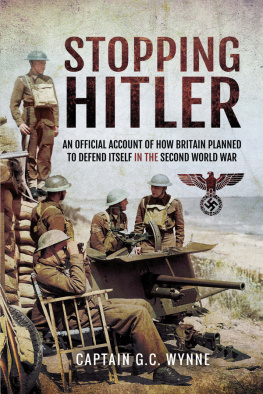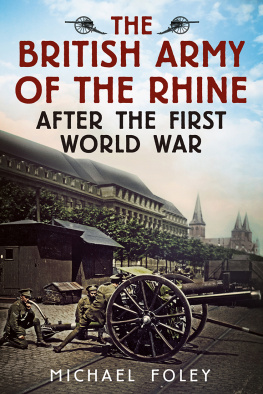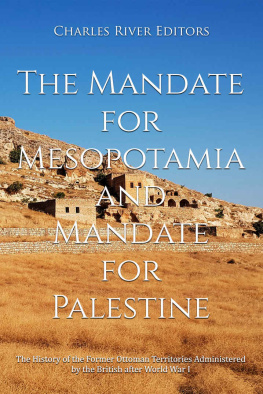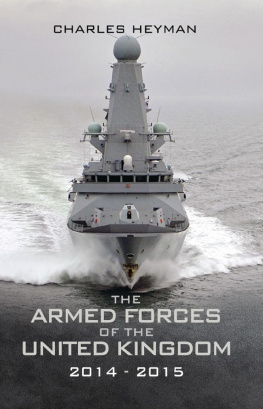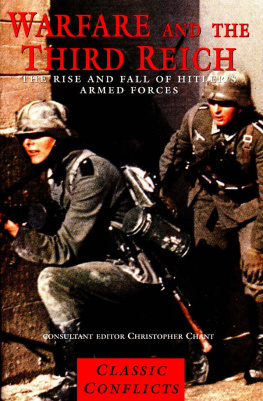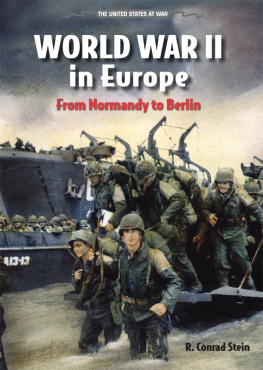
STOPPING
HITLER
AN OFFICIAL ACCOUNT OF HOW BRITAIN PLANNED TO DEFEND ITSELF IN THE SECOND WORLD WAR
STOPPING
HITLER
AN OFFICIAL ACCOUNT OF HOW BRITAIN PLANNED TO DEFEND ITSELF IN THE SECOND WORLD WAR
Captain G.C. Wynne
Frontline Books
STOPPING HITLER
An Official Account of How Britain Planned to Defend Itself
in the Second World War
This edition published in 2017 by Frontline Books,
an imprint of Pen & Sword Books Ltd,
47 Church Street, Barnsley, S. Yorkshire, S70 2AS,
Based on file reference WO 277/37 (entitled Defence Plans for the United Kingdom 1939-45 and compiled by Captain G.C. Wynne) at The National Archives, Kew, and licensed under the Open Government Licence v3.0.
Text alterations and additions Frontline Books
ISBN: 978-1-47389-552-2
eISBN: 978-1-47389-554-6
Mobi ISBN: 978-1-47389-553-9
All rights reserved. No part of this publication may be reproduced, stored in or introduced into a retrieval system, or transmitted, in any form, or by any means (electronic, mechanical, photocopying, recording or otherwise) without the prior written permission of the publisher. Any person who does any unauthorized act in relation to this publication may be liable to criminal prosecution and civil claims for damages.
CIP data records for this title are available from the British Library
For more information on our books, please visit
www.frontline-books.com
email
or write to us at the above address.
Foreword
The purpose of this monograph is to give a general account of the plans made for Home Defence during the war period 1939-1945. It is arranged in four parts corresponding to the four different threats which developed with the changing situations of the war.
For the United Kingdom the defensive phase lasted from 1939 to 1942. It is dealt with in deals with the threats which arose after the United Kingdom had become the base for the Allied counteroffensive into Europe.
Captain G.C. Wynne
Historical Section, Cabinet
19 May 1948
Publishers Note
As far as possible, this official history is reproduced in the form that it was originally written. Aside from correcting obvious spelling mistakes, most frequently in places names, or typographical errors, we have strived to keep our edits and alterations to the absolute minimum. A direct consequence of this policy is that there are occasional inconsistencies in the text.
Glossary
| A.C.I. | Army Council Instruction |
| Admiralty Monograph (In Admiralty Historical Section) |
| Admiralty M | File in Admiralty Record Office |
| Air Historical Branch (in Air Historical Section) |
| Archivist and Librarian's File (Cabinet Historical Section) |
| A.M.B. | Air Ministry Bulletin (in air Ministry Record Office) |
| A.R.D. | Air Raid Damage and Shelter Policy |
| Air Raid Precautions |
| B/Defence/Invasion | Ministry of Defence File |
| Cabinet Conclusions |
| Cab. Reg | Cabinet Registry File |
| C.B.C. | Crossbow Committee |
| C.C. | Combined Commanders: Papers |
| Civil Defence Committee |
| Committee of Imperial Defence |
| Chiefs of Staff |
| Cabinet Papers |
| D.C.M. | Ministerial Committee on Disarmament |
| D.C.O.S. (A.A.) | Deputy Chiefs of Staff (Anti-aircraft) Committee |
| D.O. | Defence Committee (Operations) |
| D.P.(P) | Ministerial Committee on Defence Plans (Policy) |
| D.P.R. | Ministerial Committee on Defence Policy and Requirements |
| D.R.C. | Defence Requirements Committee |
| Home Defence Committee |
| H.D.S. | Home Defence Scheme |
| Home Forces |
| General Headquarters |
| E.C. | Eastern Command |
| S.E.C. | South-Eastern Command |
| S.C. | Southern Command |
| Joint Intelligence Committee |
| J.P.C. | Joint Planning Committee |
| Key Point Information Directorate |
| L.F. | Land Forces |
| War Cabinet (Miscellaneous) |
| P.D.(E) | Passive Defence (Evacuation) |
| P.D.C. | Port Defence Committee |
| V.P.A. | Vulnerable Points Adviser |
| War at Sea, The | Preliminary Narrative (A7) in 2 volumes, compiled by the Admiralty Historical Section. |
| W.M. | War Cabinet Meeting |
| W.P.(G) | War Cabinet Papers (General) |
Part I
HOME DEFENCE PLANS 1933-39 The Threat of a Knock-out Blow from the Air
Chapter 1
The Attempt to Prevent German Aggression 1933-36
Effect of the Ten Year Rule
After the conclusion of the 1914/18 War British policy was diverted to the promotion of peace and to the reduction and limitation of armaments. The signing of the Covenant of the League of Nations by the chief countries of the world in 1919 led to the hope that international disputes might be settled by arbitration, and aggressors outlawed by a system of collective security.
The prospect of another European conflict seemed, in fact, so remote that the accepted the assumption that no major war would take place for ten years. That assumption, for the purposes of the Estimates for the Defence Services, was re-affirmed in 1928. The little urgency attached to the armed strength of this country is illustrated by the fact that in 1931 the total effective expenditure on the Navy, Army, and Air Force together (88,900,000) was less than the State dole to relieve unemployment (89,222,000). Our absolute naval strength had been so diminished as to render the Fleet incapable of affording efficient protection to our trade in the event of war. The Army had been pared to the bone, and was so small that it was not capable of fulfilling our international commitments. The Air Force, which in 1918 had been among the strongest in the world, both in quality and quantity, ranked fifth in terms of first-line strength.
In 1932 the principle of collective security under the League of Nations met its first test. The attack on Shanghai on the 2nd February by Japan was a deliberate act of aggression against China, a fellow member of the League, and demanded intervention. But no concerted arrangements for the application of armed force, nor even for the enforcement of sanctions under Article XVI of the Covenant, were found practicable. As a consequence the League came to be regarded not as a super-State with an international police force but rather as an organization to prevent conflict by building up the machinery for conciliation. The Japanese incident gave the warning that international law had as yet only moral force behind it.
In 1932, too, the situation in Germany became menacing. A National-Sozialistiche (Nazi) party, with a dictator, Herr Hitler, as its leader and the crooked cross of the Swastika as its emblem, became the strongest political party in the country. The party programme, proclaimed openly in Herr Hitlers political testament, Mein Kampf, was based on the belief that Germany deserves to be master of the World; and the aim was peace established by the victorious sword of a people of overlords which can bend the world to the service of a higher culture. France and Russia were to be destroyed; France as an act of revenge and liberation, and Russia in order to gain soil and territory for an increase in the German population from 50 millions to 250 millions within the next hundred years. In October 1933 Germany withdrew from the League of Nations with the declared intention to re-arm. Re-armament and the re- establishment of munition and aircraft factories had, in fact, already taken place on a considerable scale.
Next page
